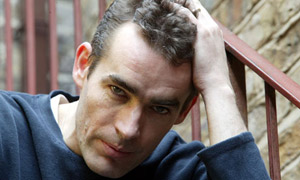 Rufus Norris
Rufus Norris
Born 1965, Cambridge. He starts as a theatre director. He directed several shows, such as AFORE NIGHT COME in 2001, FESTEN in 2004, LES LIAISONS DANGEREUSES (starring Laura Linney) in 2008. In 2009, he made his screen debut with the short film KING BASTARD. BROKEN is his first feature film.
Rufus Norris
Nato nel 1965 a Cambridge. Si afferma in origine come regista teatrale, mettendo in scena testi come AFORE NIGHT COME nel 2001, FESTEN nel 2004, LE RELAZIONI PERICOLOSE (con Laura Linney) nel 2008. Esordisce come regista cinematografico con il cortometraggio KING BASTARD (2009). BROKEN è il suo primo lungometraggio.
Director’s statement
What drew me most to this beautiful and incredibly moving story was a two-fold challenge: to capture the essence of this open, vital child whilst having compassion for all the adults who in their separate ways manage to fail her; and to draw an unsentimental and total celebration of life from a seemingly tragic place.
I have a strong dislike of two-dimensional representation of anything, particularly ‘bad’ people, so was very drawn by the opportunity of showing a very dysfunctional neighbourhood without being simplistic about any of the characters. The themes of love, responsibility, parenting and how to co-exist with others are very current, and very close to my life.
In life, everyone’s actions are justified if you stand in their shoes, and a great appeal of the story was to stand in the shoes of some very different people, who are often perpetrating very unsocial behaviour. I do not condone terrible behaviour, but neither do I have time for the easy demonization that contemporary society is very quick to hand out; compassion is not weak, it’s what makes us human and is an essential tool for three-dimensional storytelling.
Certainly our society and modern life put us under pressures that have nothing to do with contentment or happiness. Own this, be like this, compete, control your life, etc. For me there is no great answer, no brilliant philosophy, other than to be aware of your own patterns and try to be responsible with regard to others.
Most of us respond to love, want to be loved, so I think this film is a meditation on that, in its several forms. Requited and unrequited, infatuated, romantic and platonic, and finally unconditional, which is perhaps the only trustworthy form. Certainly innocence plays a large part in it - in many ways it can be seen as a loss-ofinnocence story, for many of the characters. It is also a meditation on the impossible art of responsible parenting! They all get it wrong, and they all pay the price. Sometimes love is not enough.
Dichiarazioni del regista
È stata una doppia sfida ad avvicinarmi a questa storia bella e commovente: da un lato, volevo cogliere l’essenza di questa ragazza libera e vitale, pur avendo compassione per tutti gli adulti che, ciascuno a suo modo, finiscono per deluderla; dall’altro lato, volevo ottenere una celebrazione totale e non sentimentale della vita, partendo da un contesto apparentemente tragico.
Non mi piace la raffigurazione “bidimensionale”, in particolare dei cattivi, perciò mi affascinava la possibilità di mostrare un quartiere fuori dal comune, senza essere semplicistico nella caratterizzazione dei personaggi. I temi dell’amore, della responsabilità, dell’educazione, e della coesistenza con gli altri sono sempre attuali e mi toccano da vicino.
Nella vita si possono giustificare le azioni di chiunque, se ci si mette nei loro panni, e il grande fascino di questa storia consisteva proprio nell’immedesimarsi in persone molto diverse tra loro che spesso si comportano in modo antisociale. Non giustifico i cattivi comportamenti, ma non condivido nemmeno la tendenza alla facile demonizzazione che contraddistingue la società moderna: la compassione non è indice di debolezza, ma è ciò che ci rende umani, ed è uno strumento essenziale per raccontare storie “tridimensionali”.
Sicuramente la nostra società e la vita moderna ci impongono cose che non hanno nulla a che vedere con la gioia e con la felicità. Devi avere questo, devi essere come quest’altro, devi essere competitivo, devi avere il controllo della tua vita, e così via. Per me non ci sono grandi risposte, né filosofie illuminanti, se non la consapevolezza dei propri modelli e il senso di responsabilità nei confronti degli altri.













 Rufus Norris
Rufus Norris